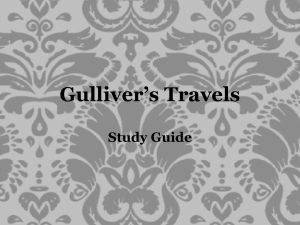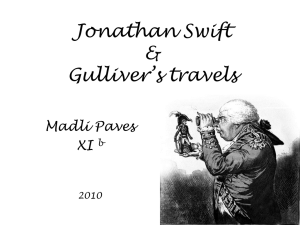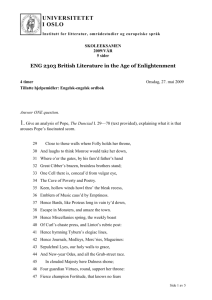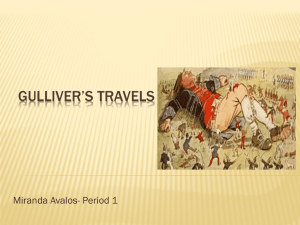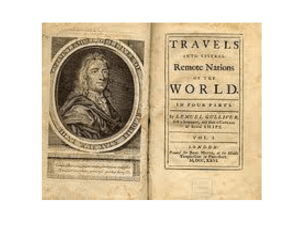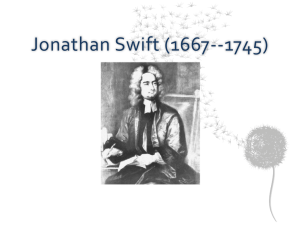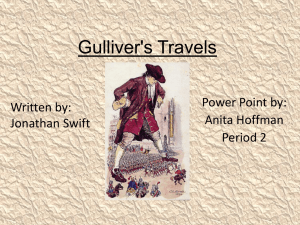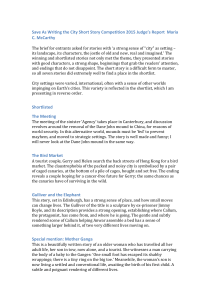File - The Life and Times of Jack Koki
advertisement
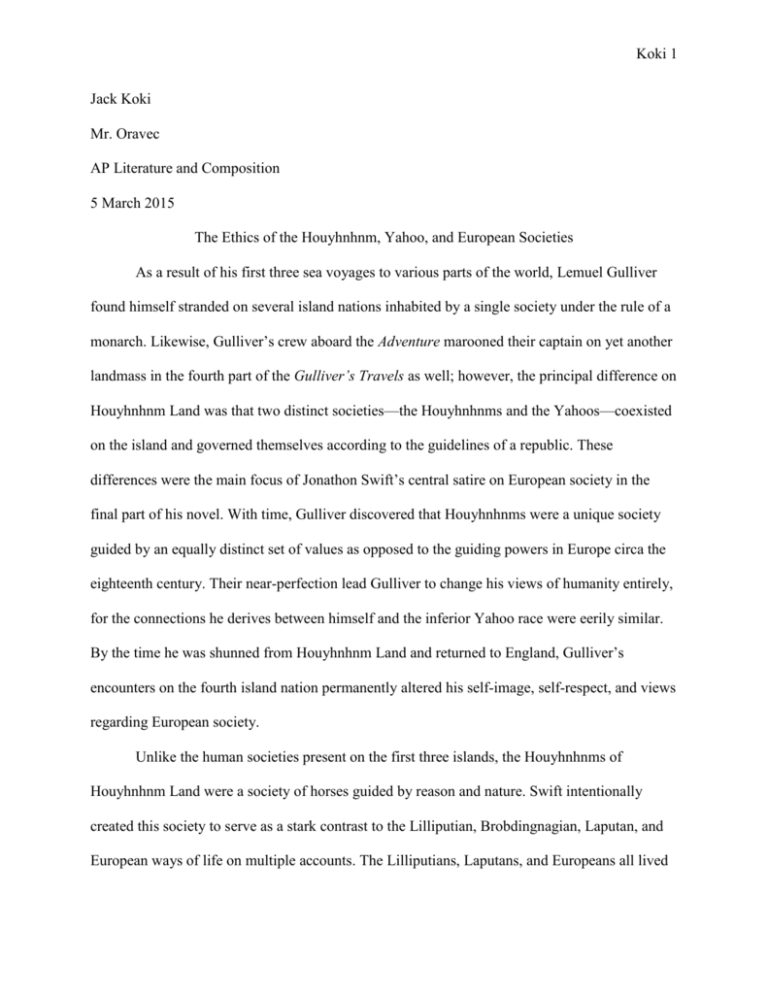
Koki 1 Jack Koki Mr. Oravec AP Literature and Composition 5 March 2015 The Ethics of the Houyhnhnm, Yahoo, and European Societies As a result of his first three sea voyages to various parts of the world, Lemuel Gulliver found himself stranded on several island nations inhabited by a single society under the rule of a monarch. Likewise, Gulliver’s crew aboard the Adventure marooned their captain on yet another landmass in the fourth part of the Gulliver’s Travels as well; however, the principal difference on Houyhnhnm Land was that two distinct societies—the Houyhnhnms and the Yahoos—coexisted on the island and governed themselves according to the guidelines of a republic. These differences were the main focus of Jonathon Swift’s central satire on European society in the final part of his novel. With time, Gulliver discovered that Houyhnhnms were a unique society guided by an equally distinct set of values as opposed to the guiding powers in Europe circa the eighteenth century. Their near-perfection lead Gulliver to change his views of humanity entirely, for the connections he derives between himself and the inferior Yahoo race were eerily similar. By the time he was shunned from Houyhnhnm Land and returned to England, Gulliver’s encounters on the fourth island nation permanently altered his self-image, self-respect, and views regarding European society. Unlike the human societies present on the first three islands, the Houyhnhnms of Houyhnhnm Land were a society of horses guided by reason and nature. Swift intentionally created this society to serve as a stark contrast to the Lilliputian, Brobdingnagian, Laputan, and European ways of life on multiple accounts. The Lilliputians, Laputans, and Europeans all lived Koki 2 in close proximity to other nations, and with their powerful naval forces, their geographic locations were suitable for extending their rule and societal views on others. The island nation of Houyhnhnm Land, however, was confined to an isolated area on the globe, so there were no foreign nations available for the Houyhnhnms to conquer or force their views upon in the first place. Therefore, their society saw no reason to maintain a potent naval presence surrounding their island at all. Despite their naval strengths, the Lilliputians, Laputans, and Europeans could have devoted their ships and vessels solely for defending the borders of their nations during times of war. Nevertheless, the monarchs of all three societies allowed their vices of power, greed, and superiority to cloud their abilities to think rationally. As requested by their leaders, the navies of each nation consequently carried out imperial domination as a primary objective. In addition to their desires to conquer surrounding nations, Swift also used the Houyhnhnm society to expose the Europeans’ tendency to lie. The only way Gulliver’s master could perceive the concept of lying was as “…the thing which was not…” (Swift 238). The Houyhnhnm master was baffled as to why the Europeans would have such an audacious motive to state the opposite of what was true. In Houyhnhnm society, either a particular event truly happened, or the event in question never occurred in the first place. Because of their societal beliefs in fact and reason, Gulliver’s master saw no logical explanation for any European, including Gulliver, to obscure the truth, implying that the Europeans lack rationality. Swift further satirizes this point by uncovering the significant value that the Europeans placed on personal testimony in the legal system. When attempting to explain the process to his master, Gulliver “remember[ed] it was with extreme difficulty that I [Gulliver] could bring my master to understand the meaning of the word opinion, or how a point could be disputable…” (Swift 268). His Houyhnhnm master had difficulty understanding why occupations like lawyers Koki 3 and attorneys served such fundamental roles in European politics. The legal system in Europe involved two different attorneys representing the two opposing parties in a court hearing. After a series of debates and disputes, the verdict of the case was reached based on which attorney could better present the evidence of a particular case to a panel of jurors. However, a hearing based on personal testimony would never transpire in Houyhnhnm society because they are guided by reason; in their eyes, only one of the parties truly committed the criminal act in question, and they would expect the guilty party to be convicted and punished for their wrongdoings. Due to their guidance by facts, Gulliver’s master viewed the role of lawyers in Europe as trivial and completely unnecessary, the exact opposite of how Gulliver felt about the importance of the profession. Through its inability and unwillingness to rule over others complemented by its reliance on fact and reason, the Houyhnhnm society satirizes a myriad of human vices embodied in the Lilliputians, Laputans, Gulliver, and most notably, his European equivalents. Gulliver arrived on Houyhnhnm Land unaware of the numerous vices engrained in his character; his obliviousness even caused himself to consider the Europeans, particularly Englishmen, as a superior race. However, his time and experience on the island nation forever changed his views of humanity. Gulliver’s thoughts regarding the superiority of the English race quickly subsided after observing his Houyhnhnm master and the rest of the Houyhnhnm race while stranded on the island. Gulliver became aware of their near-perfection as he observed their lack of nearly all human vices existent in European society, including destructive emotions, lying, greed, a desire to attain power, and even jealousy. Nonetheless, the Houyhnhnms also lacked some characterizing qualities that would differentiate one human from another, such as humor and wit. Thus, the only minor flaw Gulliver noticed in the Houyhnhnms is that they lacked personal identity; the Houyhnhnms were so alike and lacked so much individuality to the Koki 4 point that they were interchangeable with one another. Despite this minor flaw, however, Gulliver’s observations of the Houyhnhnms drove him to realize that the Europeans were undeniably an inferior race when put in perspective to Houyhnhnms. Likewise, Gulliver became aware of his race’s subsidiarity through observing the Yahoos, the species inferior to the Houyhnhnms. When he first encountered the creatures after landing on the island, Gulliver made several observations of the Yahoos. “Their heads and breasts were covered with a thick hair…” (Swift 221), “they had beards like goats…” (Swift 221), “[they] climbed high trees, as nimbly as a squirrel…” (Swift 221), and the females even had “…dugs [that] hung between their fore-feet…” (Swift 222). When one of the Yahoos initially approached Gulliver, he retaliated violently by hitting it with the blunt edge of his sword. From there, the Yahoos resorted to the heinous act of throwing their feces at Gulliver until his Houyhnhnm master appeared, scaring the savage beasts away. After reviewing the incident, Gulliver noticed multiple similarities that existed between the beastly Yahoos and his own European race. In terms of physical appearance, men typically developed thick beards, women usually had immense breasts, and both species had heads covered in thick hair. They also behaved similar from a psychological standpoint. Both species were violent and easily frightened; additionally, they lacked morality along with rationality. Due to all the parallels he established between the two races, Gulliver discovered further evidence suggesting that the Europeans, just like the Yahoos, were an inferior race when .compared to the Houyhnhnms. With this newfound realization of inferiority, Gulliver aspired to assimilate to the societal standards of the Houyhnhnms to regain his sense of superiority. During his stay on Houyhnhnm Land, Gulliver devoted himself to learning the native language of the Houyhnhnms. In doing so, he grew extremely fond of the island and Houyhnhnm culture and abandoned any desires of Koki 5 returning back to England and his family. Nevertheless, the Houyhnhnms themselves grew weary of Gulliver’s presence on their island. Although he respected their society and made attempts to become a member, the Houyhnhnms viewed Gulliver more as a Yahoo than a Houyhnhnm. After all, Gulliver and the Yahoos shared numerous characteristics; if anything, Gulliver was a slightly superior Yahoo in the eyes of the Houyhnhnms on account of his slight capacity for reason. Therefore, the Houyhnhnms grew concerned that slightly superior Gulliver would be capable of organizing the Yahoos to revolt against the Houyhnhnms if they allowed him to stay on their island permanently. As a result of their worries, Gulliver’s master took action to prevent such an uprising and evicted him from the island of Houyhnhnm Land entirely. Following his expulsion, he roamed the surrounding islands helplessly until a ship passing through a nearby channel spotted Gulliver and brought him back to England safely. Nevertheless, his time spent on Houyhnhnm Land permanently altered his self-image and selfrespect from this point onward. Gulliver would forever view himself as an inferior individual part of an equally inferior race and society. Gulliver’s experiences and encounters on Houyhnhnm Land opened his eyes to the true subsidiarity of Europe’s society during the late eighteenth century. The nearly-perfect Houyhnhnms along with the substandard Yahoos helped him realize that human nature is contaminated with an abundance of vices and immoralities, and that Europe’s societal norms were far from matching those of the truly superior Houyhnhnm society. In short, Lemuel Gulliver’s fourth and final sea voyage to Houyhnhnm Land was one that eternally altered his opinions of European society and the rest of humanity. Koki 6 Work Cited Swift, Jonathan. Gulliver's Travels. New York, N.Y.: Pocket Books Publication, 1972. 221-268. Print.
